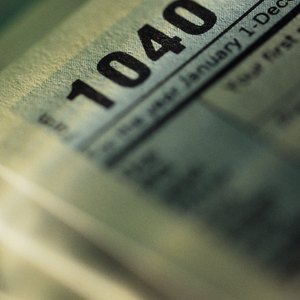
Income is only one factor that determines if you must file income tax returns or not. The IRS releases income minimum requirements that need to be reached before a person is required to file taxes. However, these annually released figures are not based on income alone. Depending upon your age, filing status and whether or not someone claims you on her taxes, you may find yourself having to file, even if you earn a lot less than $10,000 in a given year. And, while you might not be required to file, it’s not a bad idea to do so. You could be missing out on tax credits that can net you a refund check at tax time. With that in mind, if you have been asking yourself, "Will I get a tax refund if I made less than $10,000?", you are strongly encouraged to learn more about deductions and credits available to you.
Tips
If you make less than $10,000 per year, you may still be required to file taxes. This depends on the filing year, as well as your age and filing status.
Claiming Minimum IRS Income Requirements
Every year before tax time, the IRS takes inflation into account and announces new minimum income requirements that wage earners must reach before they’re required to file. The age you use for your filing status when file taxes in 2018 is the age you were at the end of 2017. Below you’ll find a list of the various filing statuses, and the corresponding minimum income requirements for filing 2017 taxes. These figures should help you answer the question, "If I make $10,000 a year how much tax will I pay?"
Single
- Under 65 years of age: $10,400
- 65 years of age or older: $11,950
Head of Household
- Under 65 years of age: $13,400
- 65 years of age or older: $14,950
Married Filing Jointly
- Under 65 years of age (both spouses): $20,800
- 65 years of age or older (one spouse): $22,050
- 65 years of age or older (both spouses): $23,300
Married Filing Separately
- Any age: $4,050
Qualifying Widow/er
- Under 65 years of age: $16,750
- 65 years of age or older: $18,000
As you can see, it is entirely possible to earn more than $10,000 per year and not have to file taxes, unless you’re married filing separately. But, you may be missing out on tax credits that could result in a refund. It is important to note that self-employed filers, such as freelancers or independent contractors, will need to file taxes if their gross income exceeds more than $400 in any given year.
Income requirements are set to change. For the 2018 tax year, you'll need to go by the following figures:
Single
- Under 65 years of age: $12,000
- 65 years of age or older: $13,600
Head of Household
- Under 65 years of age: $18,000
- 65 years of age or older: $19,600
Married Filing Jointly
- Under 65 years of age (both spouses): $24,000
- 65 years of age or older (one spouse): $25,300
- 65 years of age or older (both spouses): $26,600
Married Filing Separately
- Any age: $5
Qualifying Widow/er
- Under 65 years of age: $24,000
- 65 years of age or older: $25,300
Deductions and Income Requirements
As far as the IRS is concerned, if you earn income, then it’s subject to taxation, regardless of your age. The decision to file taxes for dependents is often a confusing one for parents of children and caretakers of adult dependents. For dependents, the IRS has specific, yet different, rules for minimum income requirements. Although dependents can’t claim themselves as an exemption on their own returns for the same year they're being claimed on another person’s return, this does not mean they do not have to file taxes on income they receive. Dependents must report all income – both earned and unearned – on their personal tax returns. Earned income typically comes from wages earned in the course of working a job, while the latter income often comes in the form of dividends, capital gains or interest from investments.
A single filer has a minimum income requirement of $10,400 for 2017, but dependents who need to file taxes on their earnings have a much lower income requirement. For 2017, your child or adult dependent claimed on your taxes, can earn no more than $6,300 ($6,350 in 2018) in earned income before he needs to file his own personal return. The figure for unearned income is a lot lower. If your dependent is under age 65, then the amount of unearned income she can make before needing to file taxes is $1,050. When the combined earned and unearned incomes total more than $6,300, then she is required to file.
Keep in mind that valuable credits, such as the child tax credit 2017, will only become available once you have decided to file your taxes.
Filing Your Return
You can use IRS Form 1040 in order to document your adjusted gross income alongside any and all qualifying deductions and exemptions.
References
- IRS: Publication 17 (2017), Your Federal Income Tax
- TaxAct: Dependent Income - Filing Requirements
- TurboTax: Tax Filing Requirements for Children
- efile.com: Do You Have to File a 2018 Tax Return?
- Forbes: Do You Need To File A Tax Return In 2018?
- IRS. "Publication 501 Dependents, Standard Deduction, and Filing Information," Pages 2-5. Accessed March 20, 2020.
- Tax Foundation. "2019 Tax Brackets." Accessed March 20, 2020.
- IRS. "Filing Status," Page 7. Accessed March 20, 2020.
Writer Bio
Tara Thomas is a Los Angeles-based writer and avid world traveler. Her articles appear in various online publications, including Sapling, PocketSense, Zacks, Livestrong, Modern Mom and SF Gate. Thomas has a Bachelor of Science in marine biology from California State University, Long Beach and spent 10 years as a mortgage consultant.
